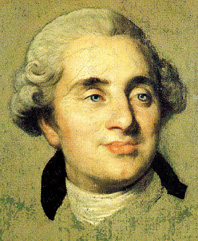| 1774 |
Louis XVI follows his grandfather Louis
XV to the French throne at a time when France had faced defeat in war by
Britain [Treaty of Paris, 1763] and mounting financial woes. Instead of
addressing France's problems, Louis proved to be a weak man who succumbed
to the schemes of advisors and his wife, Marie Antoinette, a daughter of
Maria Theresia of Austria, who possessed her mother's will, but not her
skills. |
| 1778 |
France enters the War of the American Revolution
on the side of the American colonies, primarily motivated by a desire for
revenge against the British, although some in France are also sympathetic
to American ideals of liberty. |
| 1783 |
Treaty of Paris ending the American war.
France emerges with few concrete gains, and a debt situation approaching
catastrophe. Involvement with America has also "infected" many French with
the revolutionary spirit, which reinforces the existing admiration of Great
Britain. |
| 1785 |
On the demand of bankers, Louis has an accounting
made of his government's financial position. The results are even worse
than expected. The bankers agree to lend more money to Louis only if he
puts their nominee, Jacques Neckar, in charge of finances. The King does
this, although it is humiliating: Neckar is both a commoner and a Protestant. |
| 1788 |
The King has come to recognize the need
for fundamental change, especially to force the nobility and clergy to
pay taxes. He orders the election of the an Estates-General, the first
since 1614 -- the King himself, no stranger to liberal ideas, has ended
Absolutism. |
| 1789 |
-
The Estates General is elected under the rules
last used in 1614. Very quickly, it is clear that the nobility and clergy
-- the First and Second Estates -- still predominate under these rules
and will resist any change. The Third Estates, representing the middle
class, become increasingly angry. A pampleteeer, Sieyes writes, "What is
the Third Estate? ... The Third Estate is the nation."
-
The King, nervous at the growing radicalism
of the Third Estate attempts to lock them out of their meeting hall at
Versailles, but they meet at the only available site and swear the "Tennis
Court Oath" [June 20] and declare themselves the "National Assembly."
-
While the King vacillates, rioting opens in
Paris. The middle class their organize a "National Guard" under Lafayette
supposedly to keep order. The King at last acts by firing Neckar, but this
leads to the storming of the Bastile [July 14].
-
Unwilling to use force, the King recognizes
the National Assembly and signs [August 5] its Declaration of the Rights
of Man and Citizen -- constitutional government, a limited monarchy, is
instituted.
-
The Great Fear -- across France, peasants rise
up and seize the land as they hear garbled accounts of the events in Paris.
Thousands of nobles flee into exile.
-
In October, the people of Paris force the King
and his family to take up residence in Paris and abandon Versailles.
|
| 1790 |
The new elected government acts to resolve
the governments financial woes by seizing the property of the Church and
selling it. The results raising much cash, but the middle class is pitted
against the peasantry: the peasants want the Church lands, which they have
often seized already, given to them, while the affluent middle class buys
the land with cash. Moreover, clergy who will not swear allegiance to the
new government are thrown into opposition. Many clergy flee and join emigre
nobles at the court of Emperor Leopold II, Marie Antoinette's brother,
urging him to invade France and reverse the Revolution. |
| 1791 |
With Imperial troops massing in Germany,
Louis XVI is persuaded by his wife to flee France and lead the invasion.
However, the King and his family are recognized and arrested at Varennes. |
| 1792 |
-
Under pressure from the Assembly, Louis signs
a declaration war against Emperor Leopold. The war begins with French defeats
and an Imperial invasion.
-
Frightened by the war and intimidated by the
mobs in Paris, the Assembly turns radical: mass conscription of soldiers,
confiscation of supplies, arrest of suspected "enemies," a new democratic
constitution.
-
Under the new constitution, elections in August
yield a radical Assembly dominated by the Jacobins. On September 21, the
Assembly declares a Republic: Louis XVI is placed under arrest. The Assembly
will govern as a "National Convention."
-
The Imperial forces are defeated at the Battle
of Valmy. Although the war will continue, the risk of imminent defeat is
eliminated.
-
Louis XVI is placed on trial. One of the prosecutors
is his distant cousin, formerly Louis-Philippe, Duke of Orleans, who has
joined the revolution and renamed himself Louis-Philippe Egalité.
The trial is a foregone conclusion, and Louis is condemned to death.
-
The British government warns that if Louis is
executed, it will declare war on France. The British King George III offers
sanctuary to Louis, but the National Convention refuses.
|
| 1793 |
January -- Louis XVI executed -- Great Britain
declares war. |

